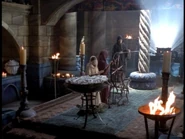The Three Fates are responsible for maintaining the destinies of all Gods and mortals living under Zeus's Olympian order. They are Clotho, who spins the thread of life to mortals and Gods alike; Lachesis, who measures the threads of each individual; and Atropos, who cuts each thread of life when it is time for someone to die. Their appearances reflect their functions: Clotho appears as a young maiden, Lachesis as a mature woman, and Atropos as a crone.
As a general rule, the Fates work with the other Gods to determine the proper times for a person's death and it seems that any Olympian of sufficient rank can order or delay the death of a mortal (such as when Ares ordered the Fates to cut Xena's thread if she interfered with Hope). Zeus's authority is the one the Fates hold in highest regard and Atropos will not cut the thread of someone under his protection. The Fates' connection to or relationship with Celesta is unclear, but it is possible that the rightful time for Celesta to collect a soul is when Atropos cuts it.
In spite of their membership in the Olympian pantheon and their respect for the authority of Zeus, the Fates are aware of events and destinies beyond the pantheon. Most notably, they were aware that the Twilight of the Gods was at hand and informed Zeus and Hera that there was nothing that could be done to prevent it. Later on, they gave Xena a cryptic clue as to how to kick-start Twilight and unsurprisingly, they did not assist the Olympians when the final battle began.
The fate of the Fates is unclear- after Gabrielle destroyed their loom to return history to normal, it is possible that they and their control over destiny ceased to exist, though since they predicted and survived Twilight in the first place, it is possible that they continue to exist, content with their threads.
Powers and abilities[]
As essentially specialized goddesses, the Fates possess the same powers and abilities as the Olympian gods, but their special power is the sight, which includes clairvoyance, divination, and prophecy. The fates do not control events, they only predict what may happen, it seems that fates read the predisposition of events to occur.
Mythology[]
- In Greek mythology, the Fates were known as the Moirai. There was considerable inconsistency as to their power in relation to the other Gods, as well as their origins, with some saying they were the daughters of Nyx and Erebus, making them sisters of Hypnos, Thanatos, and Nemesis while others said they were the daughters of Zeus and Themis. In Plato's Republic, The Fates are daughters of Ananke, primordial goddess of necessity.
- The names of the Moirai are literal indications of their functions. Clotho translates to "spinner," Lachesis to "allotter" and Atropos to "inevitable."
- In Etruscan mythology, Atropos was called Athrpa. Their names for Clotho and Lachesis remain unknown.
- In Roman mythology, the Fates were called the parcae, and were individually named Nona ("the ninth", Clotho), Decima ("the tenth", Lachesis), and Morta ("death", Atropos).
- In Norse and Germanic mythology the equivalents of the Fates were the Norns and were named Urðr or Wyrd, Verðandi, and Skuld. Although the meanings of their names provide a clue to which ones spin, measure and cut, the texts do not make it explicit.
- It has been suggested that the Fates were the inspiration for Shakespeare's Three Witches in "Macbeth."
- In the Xenaverse, the Fates appear to be different ages based on their function. This is a modern artistic license, that is not present in Greek, Roman or Nordic mythology- all three Fates (and all Norns) were usually described as old women, leading them in later times to be confused with the graiai.



